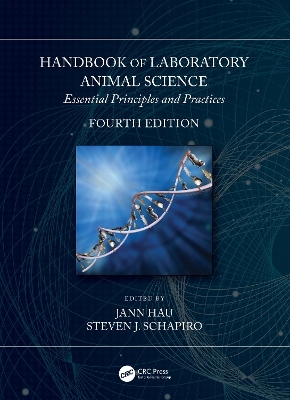
Handbook of Laboratory Animal Science
CRC Press (Verlag)
978-1-138-34180-7 (ISBN)
Building upon the success of previous editions of the bestselling Handbook of Laboratory Animal Science, first published in 1994, this latest revision combines all three volumes in one definitive guide. It covers the essential principles and practices of Laboratory Animal Science as well as selected animal models in scientific disciplines where much progress has been made in recent years. Each individual chapter focuses on an important subdiscipline of laboratory animal science, and the chapters can be read and used as stand-alone texts, with only limited necessity to consult other chapters for information.
With new contributors at the forefront of their fields, the book reflects the scientific and technological advances of the past decade. It also responds to advances in our understanding of animal behavior, emphasizing the importance of implementing the three Rs: replacing live animals with alternative methods, reducing the number of animals used, and refining techniques to minimize animal discomfort.
This fourth edition will be useful all over the world as a textbook for laboratory animal science courses for postgraduate and undergraduate students and as a handbook for scientists who work with animals in their research, for university veterinarians, and for other specialists in laboratory animal science.
Jann Hau, M.D., is Head of the Department of Experimental Medicine and the centralized Animal Care and Use Programme at the University of Copenhagen. He has had similar positions at the University of Uppsala and University of London (The Royal Veterinary College). Jann’s research has focused on the use of laboratory animals as models for humans in biomedical research and his expertise is in comparative medicine, reproductive physiology, immunology, and laboratory animal science and welfare Steven J. Schapiro, Ph.D., is an associate professor of comparative medicine in the Department of Comparative Medicine at the Michale E. Keeling Center for Comparative Medicine and Research of The University of Texas MD Anderson Cancer Center. Steve earned his PhD from the University of California at Davis in 1985 in Comparative Psychology, after receiving his BA in Behavioral Biology from Johns Hopkins University. He completed a postdoctoral research fellowship at the Caribbean Primate Research Center of the University of Puerto Rico.
Animal research ethics. Alternatives: refinement, reduction and replacement of animal uses in the life sciences. Laboratory animal genetics and genetic quality control. Experimental design and statistical analysis. Behavioral needs and management of laboratory animals. Welfare assessment and humane endpoints. Impact of the biotic and abiotic environment on animal experiments. Animal research facility design and equipment considerations for conventional, barrier, and containment housing systems. Genetically modified mice. Microbiological status. Laboratory animal nutrition in routine husbandry, and experimental and regulatory studies. Common nonsurgical techniques and procedures. Laboratory animal analgesia, anesthesia and euthanasia. Surgery: basic principles and procedures. Applications of implantable radio telemetry in small laboratory animals. Physiological, hematological, and clinical chemistry. Postmortem procedures animal models for diabetes: basic principles and management. Animal models of spinal cord injury. Animal models in pain research. Rodents, sheep and non-human primates as models for human pregnancy and fetal development. Animal models in biodefense research. Animal models in neuroscience. Animal models for psychological disorders. Animal models for human behavior. Animal models of cardiovascular disease. Animal models in pharmacology and toxicology. Animal models in mycology. Animal models in oral health sciences. Animal models of hearing loss, tinnitus, and hyperacusis. Animal models for otolaryngological disorders. Animal models for eye diseases. Animal models in aids research. Models of human cancer. An overview of global legislation, regulations and policies. Laboratory animal science and service organizations. Education and training. Assessment of animal care and use programs. Reduction and refinement applied to animal models
| Erscheinungsdatum | 17.08.2020 |
|---|---|
| Zusatzinfo | 116 Tables, black and white; 145 Illustrations, color; 95 Illustrations, black and white |
| Verlagsort | London |
| Sprache | englisch |
| Maße | 210 x 280 mm |
| Gewicht | 2970 g |
| Themenwelt | Naturwissenschaften ► Biologie ► Zoologie |
| Veterinärmedizin ► Klinische Fächer ► Versuchstiere | |
| ISBN-10 | 1-138-34180-0 / 1138341800 |
| ISBN-13 | 978-1-138-34180-7 / 9781138341807 |
| Zustand | Neuware |
| Informationen gemäß Produktsicherheitsverordnung (GPSR) | |
| Haben Sie eine Frage zum Produkt? |
aus dem Bereich


